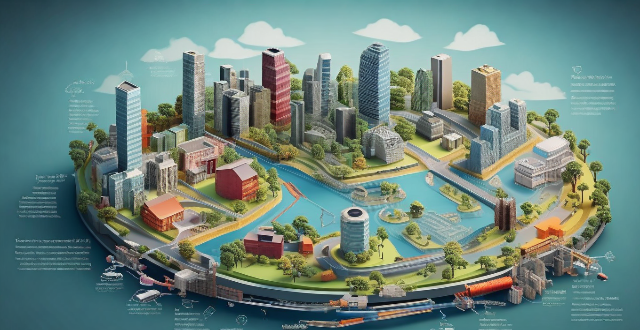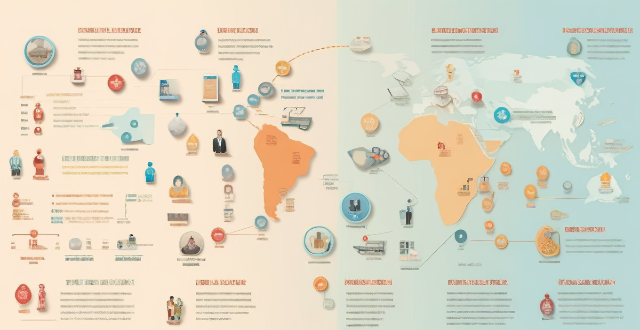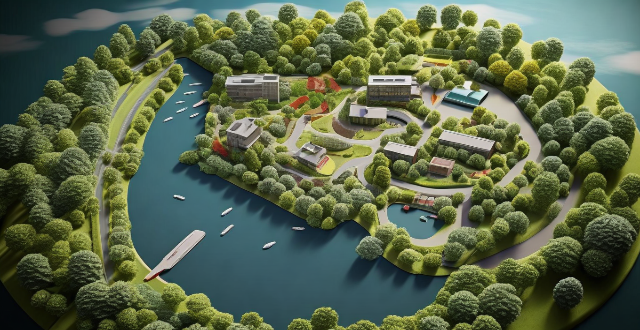Global Technological

How can carbon capture technology be scaled up to address global climate change ?
The article discusses the challenges and strategies associated with scaling up carbon capture technology (CCT) to mitigate global climate change. The challenges include high costs, technological limitations, infrastructure and logistics issues, and regulatory and legal frameworks. To overcome these challenges, strategies such as policy and economic incentives, technological innovation, infrastructure development, public-private partnerships, and international cooperation are proposed. Scaling up CCT is crucial in reducing atmospheric CO2 levels and combating global climate change.

When will 5G networks be available globally ?
The availability of 5G networks globally depends on technological development, regulatory frameworks, and infrastructure deployment. Technological advancements such as millimeter-wave spectrum and advanced antenna designs have paved the way for faster data speeds and higher capacity in wireless networks. Regulatory frameworks are crucial in determining the availability of 5G networks globally, as governments need to establish policies and standards that support its deployment while ensuring consumer safety. Infrastructure deployment is another critical factor, as building out the necessary network infrastructure requires significant investment and planning. Despite these challenges, several trends suggest that 5G networks will become more widely available over the next few years, including rapid adoption, increasing investment, and government support.

What role does natural gas play in the global energy market ?
Natural gas is a key player in the global energy market due to its environmental advantages, economic benefits, contributions to energy security, technological advancements, and versatile applications across sectors.

How does space exploration impact global cooperation and diplomacy ?
Space exploration has been a significant driver of global cooperation and diplomacy since the dawn of the space age. The pursuit of understanding our universe and the quest to explore beyond Earth's boundaries have fostered international collaboration, technological advancements, and diplomatic engagements that transcend traditional geopolitical tensions. In this discussion, we will delve into the various ways space exploration influences global cooperation and diplomacy.

How has the COVID-19 pandemic impacted global health security ?
The COVID-19 pandemic has significantly impacted global health security by overwhelming healthcare systems, necessitating public health policies such as lockdowns and quarantine measures, and highlighting the importance of international cooperation. The strain on healthcare systems included increased patient loads, shortages of medical supplies, and stress on the healthcare workforce. Public health responses involved vaccination programs, testing and tracing initiatives, and economic challenges due to lockdowns. International cooperation was essential for coordinating a global response, sharing information, and addressing misinformation. The pandemic also highlighted the need for resilient global health systems, sustained investment in public health infrastructure, collaborative research, and technological advancements. Overall, the COVID-19 crisis has prompted efforts to build stronger and more cooperative global health systems prepared for future emergencies.

What challenges do countries face when working together on a global scale ?
Global collaboration faces political, economic, cultural, and logistical challenges. Politically, differing national interests, sovereignty concerns, and leadership dynamics can impede progress. Economically, fair resource allocation, trade agreements, and sanctions are contentious issues. Culturally, language barriers, diverse values, and educational gaps pose challenges. Logistically, coordination across time zones, travel restrictions, and technology disparities complicate matters. Addressing these challenges with open dialogue and cooperation is key to achieving shared global goals.

How has financial regulation evolved over time ?
The evolution of financial regulation has been marked by significant changes in response to economic crises, technological advancements, and shifts in political ideologies. From the laissez-faire approach of early days to the rise of regulatory frameworks during the Great Depression, through the deregulation era of the late 20th century, and the renewed emphasis on regulation following the Global Financial Crisis, financial regulation has adapted to maintain stability and promote growth within the financial sector. The digital age presents new challenges, requiring regulators to adapt existing frameworks to accommodate technological innovations while ensuring consumer protection and systemic stability.

What are the benefits of the Clean Energy Revolution ?
The Clean Energy Revolution is a significant transformation that brings numerous benefits, including a healthier environment and population, economic growth and sustainability, enhanced energy security and efficiency, and innovation and technological progress. It reduces pollution and improves public health, creates jobs and opportunities, makes energy more secure and efficient, and fosters international cooperation and technological advancements. The revolution promises a more sustainable and equitable world for humanity to thrive in without compromising the planet's health.

How does global shopping contribute to economy ?
Global shopping, or cross-border e-commerce, has become a crucial aspect of the global economy. It involves buying and selling goods and services across national borders through online platforms. This phenomenon has not only revolutionized shopping but also significantly contributed to economic growth worldwide. Here are some ways global shopping boosts the global economy: 1. Increased consumer spending: Global shopping provides consumers with access to a wide range of products from around the world, leading to higher consumer spending, which is a key driver of economic growth. 2. Benefits for sellers: Businesses can reach new customers and expand their market share by tapping into international markets, increasing revenue and profitability. 3. Job creation and employment opportunities: The rise of global shopping has given birth to numerous jobs in various sectors such as logistics, customer service, marketing, and technology. 4. Boosting local economies: Local businesses can reach customers beyond their geographical boundaries by exporting their products globally, generating revenue that helps sustain their operations and contribute to the local economy. 5. Encouraging innovation and competition: The global marketplace created by cross-border e-commerce encourages businesses to innovate and improve their products to stay competitive, benefiting consumers by providing them with high-quality products at competitive prices. 6. Fostering international trade relations: Global shopping promotes cooperation between nations by facilitating trade agreements and reducing barriers to entry for businesses looking to expand internationally.

What technological advancements have been discussed or promoted at climate summits ?
Technological advancements discussed at climate summits include renewable energy technologies (solar, wind, hydroelectric power), energy efficiency and conservation measures (building design, transportation, industry), carbon capture and storage (CCS), nuclear power, agroecology and sustainable land use practices (regenerative agriculture, forest management, sustainable fisheries), and green finance and investment (green bonds, green banks, climate risk assessment). These strategies aim to mitigate the effects of climate change by reducing greenhouse gas emissions and promoting sustainable development.

How effective are international climate commitments in reducing carbon emissions ?
International climate commitments, such as those made under the Paris Agreement, aim to reduce carbon emissions and limit global temperature rise. These commitments vary in ambition and implementation can be challenging due to political, economic, and technological factors. Monitoring and verification mechanisms exist but have flaws. Many commitments focus on long-term goals, making immediate impact assessment difficult. However, they can inspire policy changes, technological innovation, and raise public awareness, leading to indirect emissions reductions. The effectiveness of these commitments depends on a range of factors including political will, economic conditions, technological advancement, and societal engagement.

How does international environmental law address global warming ?
International environmental law plays a crucial role in addressing global warming by setting standards, encouraging cooperation, and promoting sustainable practices through treaties, agreements, and principles. The Framework Convention on Climate Change (UNFCCC), the Kyoto Protocol, and the Paris Agreement are key legal instruments that establish targets for reducing greenhouse gas emissions and provide mechanisms for compliance and financial support. Other initiatives such as Regional Seas Programmes, the Convention on Biological Diversity (CBD), and Forest Law Enforcement, Governance and Trade (FLEGT) also contribute to mitigating climate change. Challenges include enforcement, political will, and ensuring equity and justice in actions taken. As the fight against global warming continues, international environmental law must adapt to evolving scientific, political, and technological landscapes, requiring collaboration and innovation among nations.

How do climate change negotiations affect global trade and economic systems ?
Climate change negotiations play a crucial role in shaping global trade and economic systems. These negotiations aim to find solutions to the challenges posed by climate change, such as reducing greenhouse gas emissions, promoting renewable energy sources, and protecting biodiversity. The outcomes of these negotiations have far-reaching implications for international trade, investment, and economic development. In this article, we will explore how climate change negotiations affect global trade and economic systems. One of the key impacts of climate change negotiations on international trade is the imposition of tariffs and subsidies on goods and services that contribute to climate change. For example, countries may impose higher tariffs on imported goods that are produced using high levels of carbon emissions or other environmentally harmful practices. Similarly, governments may provide subsidies to domestic industries that adopt sustainable practices or invest in renewable energy technologies. These measures can create trade barriers and distort market competition, affecting global trade patterns. Another way in which climate change negotiations can influence international trade is through the implementation of carbon pricing mechanisms, such as carbon taxes or cap-and-trade systems. These mechanisms aim to internalize the external costs of carbon emissions by making polluters pay for their emissions. As a result, companies that rely heavily on fossil fuels or produce high levels of emissions may face increased costs, making their products less competitive in global markets. On the other hand, companies that invest in low-carbon technologies or adopt sustainable practices may gain a competitive advantage. Climate change negotiations often lead to the adoption of stricter environmental standards and regulations at both national and international levels. These standards can affect international trade by creating compliance costs for exporters and importers. For instance, companies that export goods to countries with stringent environmental regulations may need to invest in cleaner production processes or face penalties for non-compliance. Similarly, importers may prefer to source goods from suppliers that meet certain environmental standards, affecting trade flows and market access. Climate change negotiations also have significant implications for investment and economic development. As countries commit to achieving ambitious climate targets, there is an increasing demand for green finance and investment in sustainable projects. This can create new opportunities for investors and businesses that focus on renewable energy, energy efficiency, and other low-carbon sectors. However, it can also lead to capital flight from traditional fossil fuel industries, affecting economies that rely heavily on these sectors. Climate change negotiations often include provisions for technology transfer and innovation cooperation between developed and developing countries. This can help bridge the gap between countries with different levels of technological capabilities and promote sustainable development worldwide. By facilitating the transfer of clean energy technologies and supporting research and development efforts, climate change negotiations can foster economic growth and job creation in emerging markets. Finally, climate change negotiations address the urgent need for adaptation financing and support for vulnerable communities affected by climate change. This includes funding for infrastructure improvements, disaster risk reduction, and other measures that help countries adapt to changing climate conditions. While these efforts are essential for protecting human lives and livelihoods, they also represent significant economic opportunities for businesses involved in climate resilience and adaptation services. In conclusion, climate change negotiations have far-reaching implications for global trade and economic systems. By imposing tariffs and subsidies, implementing carbon pricing mechanisms, setting environmental standards, promoting green finance and investment, facilitating technology transfer and innovation, and providing adaptation financing and support, these negotiations shape the future direction of international trade and economic development. As we continue to grapple with the challenges posed by climate change, it is crucial for policymakers, businesses, and civil society to work together to ensure that our responses to this global challenge are aligned with our collective goals for sustainable prosperity.

How has the private equity industry evolved over time ?
The private equity (PE) industry has undergone significant changes since its inception, evolving from small and mid-sized business investments to larger companies and more complex transactions. The industry has diversified into various sub-sectors like venture capital and distressed investing, allowing firms to specialize in specific areas. Technological advancements have played a crucial role in shaping the PE industry, improving investment decision-making processes. Regulatory changes have also influenced the evolution of the industry, promoting transparency, fairness, and accountability. Looking ahead, the PE industry is likely to continue evolving as it adapts to changing market conditions, technological advancements, and regulatory environments.

What are the challenges in enforcing international environmental laws related to climate change ?
Enforcing international environmental laws related to climate change faces challenges such as a lack of global leadership and coordination, inadequate legal frameworks, economic and developmental imbalances, scientific uncertainty and information gaps, socio-cultural factors, and technological and infrastructure limitations. These issues require cooperation among nations, stronger legal frameworks, balanced economic development, improved scientific understanding, cultural sensitivity, and technological advancement to overcome.

How do communication satellites impact the field of telecommunications ?
Communication satellites have revolutionized telecommunications by providing global connectivity, increasing bandwidth, and improving reliability. They allow for communication across vast distances, connecting remote areas with the rest of the world and providing access to telecom services in regions lacking terrestrial infrastructure. Modern satellite systems offer high data rates for faster internet speeds and better voice/video transmissions, supporting multiple services like voice, data, and video conferencing. Satellites also enhance reliability and redundancy as critical backups during disasters and emergencies, creating diverse communication pathways. With rapid deployment capabilities, satellites are ideal for temporary situations like military operations or emergency responses and enable mobile applications. Economically, advancing technology reduces costs, opens new markets, and fosters job creation. Technological advancements include improved modulation techniques and antenna designs for better performance. Environmental considerations involve space debris mitigation and energy efficiency. Overall, satellites significantly impact telecommunications by extending reach, increasing capacity, ensuring reliability, offering flexibility, driving economic growth, and fostering technological advancements while considering environmental implications.

What are the main challenges in achieving a successful energy transition ?
The energy transition to renewable sources faces numerous challenges that encompass technological, economic, policy, social, infrastructure, environmental, geopolitical, and natural limitations. Addressing these obstacles requires a comprehensive approach involving technological innovation, economic incentives, policy support, cultural shifts, international cooperation, and consideration of environmental impacts and resource availability.

How can international cooperation on climate change contribute to global security ?
International cooperation on climate change is vital for global security. It helps mitigate environmental disasters, promotes economic stability and growth, enhances social cohesion and peace, facilitates technology and knowledge sharing, and strengthens global governance and diplomacy. Through joint efforts, nations can address one of the most pressing challenges of our time and secure a safer future for all.

What are the latest trends in the global economy ?
The global economy is influenced by various interconnected factors including digital transformation, sustainability, global trade dynamics, monetary policies, and the rising influence of emerging markets. These trends are reshaping industries, fostering innovation, and influencing economic growth and policies worldwide.

How do building energy efficiency standards vary across different countries ?
The article discusses building energy efficiency standards and their global variations, influenced by factors like climate, economics, technology, government policies, and cultural preferences. It highlights the importance of these standards in sustainable development and reducing carbon emissions in the built environment. The text emphasizes that understanding these variations is essential for collaborative efforts and knowledge sharing as the global community strives towards decarbonization and sustainability goals.

How does global shopping affect consumer behavior ?
Global shopping has revolutionized consumer behavior by increasing accessibility, influencing decisions, raising environmental concerns, affecting the economy, changing social dynamics, driving technological advancements, and highlighting privacy issues.

How does Cross-Border Payment impact global trade ?
Cross-border payment plays a crucial role in the global trade ecosystem by enabling businesses to buy and sell goods and services internationally. It reduces transaction costs, enhances transparency and efficiency, and promotes economic growth. However, challenges related to regulatory compliance, currency fluctuations, and technological barriers need to be addressed.

How do climate summits contribute to global efforts to combat climate change ?
Climate summits play a crucial role in the global fight against climate change by setting targets and goals, encouraging international cooperation, promoting policy and technological innovation, raising awareness and mobilizing action, and financing climate action.

How does climate variability affect global weather patterns ?
The impact of climate variability on global weather patterns is substantial, affecting temperature, precipitation, wind patterns, and extreme weather events. Key influences include El Niño and La Niña phases, monsoon systems, altered rainfall distribution, jet stream variations, tropical cyclones, heatwaves, cold spells, storms, floods, and droughts. Long-term climate trends like global warming also significantly affect weather patterns. Understanding these interactions is crucial for predicting future conditions and addressing climate-related challenges.

How can we improve international cooperation among nations ?
The text outlines ways to improve international cooperation among nations, including enhancing diplomatic relations through regular dialogues and cultural exchange programs; collaborating on global issues such as climate change, poverty, hunger, peace, and security; sharing knowledge and technology by research collaboration and protecting intellectual property rights; promoting trade and economic cooperation by reducing barriers, investing in infrastructure, and maintaining fair labor standards; and building capacity for global governance by strengthening institutions and supporting developing countries.

How do climate data analysis contribute to understanding global warming ?
Climate data analysis is essential for understanding global warming, its causes, effects, and potential solutions. Scientists collect temperature records, carbon dioxide concentrations, and sea level data to identify trends, establish correlations, and create predictive models. These efforts help develop effective strategies to mitigate the impacts of global warming.

What role could international cooperation play in the development of a lunar base ?
International cooperation is vital for lunar base development, allowing cost sharing, resource optimization, innovation collaboration, risk mitigation, comprehensive data sets, research collaboration, diverse perspectives, joint missions, diplomatic ties, global leadership, cross-cultural learning, global community building, harmonized regulations, emergency response planning, environmental impact discussions, and long-term maintenance plans.

What is the role of technology in improving global health outcomes ?
Technology plays a crucial role in improving global health outcomes through advanced medical equipment, digital health solutions, and more. It has revolutionized diagnosis, treatment, disease surveillance, prevention, accessibility, affordability of healthcare services, research and development initiatives, and health literacy and education. Technology's impact on global health will continue to grow positively as it evolves at a rapid pace.

How does global shopping affect local businesses ?
Global shopping has become increasingly popular due to the rise of e-commerce platforms and international shipping services. While it offers consumers a wider range of products and competitive prices, it also poses challenges for local businesses such as increased market competition, job displacement, cultural homogenization, environmental impact, intellectual property rights issues, and economic dependency. As consumers continue to embrace global shopping, it is crucial for local businesses to adapt and find ways to differentiate themselves in order to remain competitive and sustainable in the long run.

What are the latest technological innovations in the field of artificial intelligence ?
Artificial Intelligence (AI) is a rapidly evolving field that has seen significant advancements in recent years. The latest technological innovations include Natural Language Processing (NLP), Computer Vision, and Machine Learning. NLP focuses on enabling machines to understand and generate human language, while Computer Vision enables machines to interpret and analyze visual information. Machine Learning is a subset of AI that involves training algorithms to learn from data without being explicitly programmed. These innovations have the potential to transform various industries and improve our daily lives.